 Morar perto da estação facilita a elaboração de planos de fuga. Todos os dias me ocorrem, ainda que conforte a agitação nas imediações da estação. Tantos destinos marcados e apressados, até os indigentes parecem ter um desígnio cinematográfico neste décor de fim da linha junto ao rio. As vozes roucas de homens encostados ao balcão, que pausam na tasca para chamuças e imperiais, dão alguma raíz ao universo enquanto comentadores na tv permutam argumentos sobre o Hamas, e o martelo da guerra-mundo nos estilhaça os ossos.
Morar perto da estação facilita a elaboração de planos de fuga. Todos os dias me ocorrem, ainda que conforte a agitação nas imediações da estação. Tantos destinos marcados e apressados, até os indigentes parecem ter um desígnio cinematográfico neste décor de fim da linha junto ao rio. As vozes roucas de homens encostados ao balcão, que pausam na tasca para chamuças e imperiais, dão alguma raíz ao universo enquanto comentadores na tv permutam argumentos sobre o Hamas, e o martelo da guerra-mundo nos estilhaça os ossos.
Mukanda
17.02.2026 | por Marta Lança
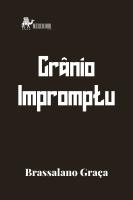 São poemas concebidos sobre destroços sonoros do corpo oriundos da negrura trágica do DrumN'Bass, do Trance, do Jungle, ou do Free Jazz. São poemas construídos como ruídos e anomalias de corpos negros, entre pesadelos eróticos, feridas surreais, e gritos políticos. Torrenciais jorros de memórias enlameadas por angústias da máquina infernal de sonhos dos trópicos. Talvez esses poemas sejam uma tentativa de responder à pergunta – a Poesia pode salvar-nos?
São poemas concebidos sobre destroços sonoros do corpo oriundos da negrura trágica do DrumN'Bass, do Trance, do Jungle, ou do Free Jazz. São poemas construídos como ruídos e anomalias de corpos negros, entre pesadelos eróticos, feridas surreais, e gritos políticos. Torrenciais jorros de memórias enlameadas por angústias da máquina infernal de sonhos dos trópicos. Talvez esses poemas sejam uma tentativa de responder à pergunta – a Poesia pode salvar-nos?
Mukanda
16.02.2026 | por Brassalano Graça
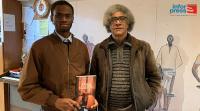 A literatura cabo-verdiana tem continuidade e novos intérpretes. Fredilson Semedo é um deles. A sua poesia revela compromisso com as duas línguas de Cabo Verde e diálogo com grandes mestres da tradição lusófona e universal. Felicito o autor por este marco na sua trajectória literária.
A literatura cabo-verdiana tem continuidade e novos intérpretes. Fredilson Semedo é um deles. A sua poesia revela compromisso com as duas línguas de Cabo Verde e diálogo com grandes mestres da tradição lusófona e universal. Felicito o autor por este marco na sua trajectória literária.
A ler
16.02.2026 | por José Luís Hopffer Almada
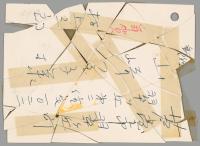 Com dizias na tua carta, os dias são fogosos, talvez andemos a brincar aos pirómanos. O vaso partido, não é apenas uma cidade que se desagrega, a dispersão ganha um encanto musical, como uma fuga de Bach, as coisas perseguem-se como melodias, entrançam-se umas nas outras. Cheguei ao café onde tínhamos combinado, o tempo passou como um foguete. Não te vou enfadar com conversas de enamorado.
Com dizias na tua carta, os dias são fogosos, talvez andemos a brincar aos pirómanos. O vaso partido, não é apenas uma cidade que se desagrega, a dispersão ganha um encanto musical, como uma fuga de Bach, as coisas perseguem-se como melodias, entrançam-se umas nas outras. Cheguei ao café onde tínhamos combinado, o tempo passou como um foguete. Não te vou enfadar com conversas de enamorado.
Mukanda
11.02.2026 | por Ricardo Norte
 Passou a visitar as campas dos seus ancestrais frequentemente, o seu maior desejo era ver-se livre desta vida terrena cheia de abismos. Num desses dias enquanto dormia, despertou e ouviu vozes ruidosas a chamar por ele em direção ao cemitério familiar e para lá foi. Quando ali chegou, ajoelhou-se na campa do avô e gritou: levem-me às alturas. No mesmo instante, uma serpente apareceu.
Passou a visitar as campas dos seus ancestrais frequentemente, o seu maior desejo era ver-se livre desta vida terrena cheia de abismos. Num desses dias enquanto dormia, despertou e ouviu vozes ruidosas a chamar por ele em direção ao cemitério familiar e para lá foi. Quando ali chegou, ajoelhou-se na campa do avô e gritou: levem-me às alturas. No mesmo instante, uma serpente apareceu.
A ler
10.02.2026 | por Edna Matavel
 O que faz, então, uma família ser uma família? Será puramente genético — uma linhagem que pode ser traçada até uma ancestralidade comum — ligando pessoas de lugares, línguas e vidas diferentes? Sabemos que os laços emocionais e a memória coletiva desempenham um papel importante nas relações de sangue. Ao mesmo tempo, a família é também uma unidade económica e, em muitos aspetos, um microcosmo da sociedade em que existe.
O que faz, então, uma família ser uma família? Será puramente genético — uma linhagem que pode ser traçada até uma ancestralidade comum — ligando pessoas de lugares, línguas e vidas diferentes? Sabemos que os laços emocionais e a memória coletiva desempenham um papel importante nas relações de sangue. Ao mesmo tempo, a família é também uma unidade económica e, em muitos aspetos, um microcosmo da sociedade em que existe.
A ler
07.02.2026 | por Avital Barak e Edgar Oliveira
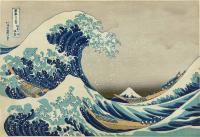 Fluindo veloz, a água submergiu em riachos nunca antes navegados, apesar dos sulcos já lá estarem. Confirmo o que dizes sobre a água escolher sempre os mesmos caminhos, escavando os sete leitos dos rios, tal como a nossa pele muda sete vezes. Uma amiga contou que, na terapia, também há sete sessões para abrir novos canais e sinapses sem insistência no “canal do trauma”. Admiro a determinação feroz da água, empapando a terra, nutrindo-a para que aguente uma muito provável seca.
Fluindo veloz, a água submergiu em riachos nunca antes navegados, apesar dos sulcos já lá estarem. Confirmo o que dizes sobre a água escolher sempre os mesmos caminhos, escavando os sete leitos dos rios, tal como a nossa pele muda sete vezes. Uma amiga contou que, na terapia, também há sete sessões para abrir novos canais e sinapses sem insistência no “canal do trauma”. Admiro a determinação feroz da água, empapando a terra, nutrindo-a para que aguente uma muito provável seca.
Mukanda
05.02.2026 | por Marta Lança
 Que o filme tenha sido exibido publicamente apenas duas vezes após o 25 de Abril e tenha permanecido décadas na sombra, até ser resgatado por investigação académica, diz muito sobre as hierarquias da memória cultural. Há obras que sobrevivem porque confortam; outras sobrevivem porque alguém insiste que não esquecer também é um acto político.
Que o filme tenha sido exibido publicamente apenas duas vezes após o 25 de Abril e tenha permanecido décadas na sombra, até ser resgatado por investigação académica, diz muito sobre as hierarquias da memória cultural. Há obras que sobrevivem porque confortam; outras sobrevivem porque alguém insiste que não esquecer também é um acto político.
Afroscreen
02.02.2026 | por Leonel Matusse Jr.
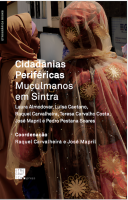 Ao privilegiar uma abordagem centrada nas vivências das pessoas, assume-se como uma disciplina humanizadora, que tenta resgatar as particularidades do dia a dia, mais além dos recortes estatísticos e dos determinismos sociais. É claro que existem estruturas, tendências e políticas que ultrapassam as vontades das pessoas e que devem ser analisadas (vejam-se os processos de racialização e de precarização), mas o olhar mais localizado sobre as suas estratégias, sonhos e aspirações permite compreender quais são as suas possibilidades de escolha em campos socialmente delimitados, situando as suas forças e fragilidades.
Ao privilegiar uma abordagem centrada nas vivências das pessoas, assume-se como uma disciplina humanizadora, que tenta resgatar as particularidades do dia a dia, mais além dos recortes estatísticos e dos determinismos sociais. É claro que existem estruturas, tendências e políticas que ultrapassam as vontades das pessoas e que devem ser analisadas (vejam-se os processos de racialização e de precarização), mas o olhar mais localizado sobre as suas estratégias, sonhos e aspirações permite compreender quais são as suas possibilidades de escolha em campos socialmente delimitados, situando as suas forças e fragilidades.
A ler
02.02.2026 | por Raquel Carvalheira e José Mapril
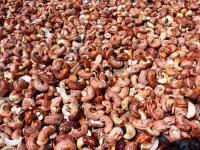 Geração após geração cresceu envolta na mesma violência estrutural que o poder colonial institucionalizou. O cajueiro permanece não apenas como símbolo da violência colonial e do apartheid económico; sobreviveu também à queda do colonialismo, às reformas da revolução e às austeridades do ajustamento estrutural. A castanha de caju — e a instabilidade política — são o mais próximo que a Guiné-Bissau tem de continuidade.
Geração após geração cresceu envolta na mesma violência estrutural que o poder colonial institucionalizou. O cajueiro permanece não apenas como símbolo da violência colonial e do apartheid económico; sobreviveu também à queda do colonialismo, às reformas da revolução e às austeridades do ajustamento estrutural. A castanha de caju — e a instabilidade política — são o mais próximo que a Guiné-Bissau tem de continuidade.
A ler
02.02.2026 | por Klas Lundström
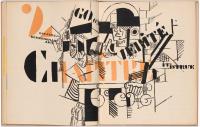 Estamos sobre a terra, mas os corpos continuam a querer viver na massa líquida de onde saíram há milhões de anos. A água deixa-nos a alma enrugada, na água passamos com tudo, uma morte rasteira que escorre conforme à gravidade. Seguir o princípio do fogo deixa-nos a cabeça alinhada com os astros, tentamos escapar à humidade onde tudo se confunde. O mundo é deslocação, como lembras na última carta, e a disponibilidade de que fala a Silvina é um combate contra esta queda que procura os lençois freáticos, Bachelard diz que é uma morte onírica, o que vai de encontro à fantasmagoria presente.
Estamos sobre a terra, mas os corpos continuam a querer viver na massa líquida de onde saíram há milhões de anos. A água deixa-nos a alma enrugada, na água passamos com tudo, uma morte rasteira que escorre conforme à gravidade. Seguir o princípio do fogo deixa-nos a cabeça alinhada com os astros, tentamos escapar à humidade onde tudo se confunde. O mundo é deslocação, como lembras na última carta, e a disponibilidade de que fala a Silvina é um combate contra esta queda que procura os lençois freáticos, Bachelard diz que é uma morte onírica, o que vai de encontro à fantasmagoria presente.
A ler
28.01.2026 | por Ricardo Norte
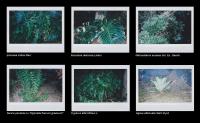 Zona de orla marítima povoada por hotéis, piscinas, cais de acesso ao mar públicos e privados, restaurantes, cafés, zonas ajardinadas, miradouros, lugares de lazer e descanso, a promenade estende-se da zona do Lido ao túnel da Doca do Cavacas que antecede a Praia Formosa, tendo daqui continuidade um percurso que vai até à baía de Câmara de Lobos.
Outrora também conhecido por Jardins do Lido, na página oficial deste passeio marítimo refere-se que é pautado por uma flora diversa composta por espécies endémicas e exóticas.
Zona de orla marítima povoada por hotéis, piscinas, cais de acesso ao mar públicos e privados, restaurantes, cafés, zonas ajardinadas, miradouros, lugares de lazer e descanso, a promenade estende-se da zona do Lido ao túnel da Doca do Cavacas que antecede a Praia Formosa, tendo daqui continuidade um percurso que vai até à baía de Câmara de Lobos.
Outrora também conhecido por Jardins do Lido, na página oficial deste passeio marítimo refere-se que é pautado por uma flora diversa composta por espécies endémicas e exóticas.
A ler
24.01.2026 | por Ana Gandum
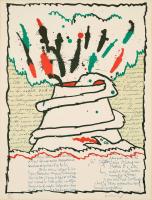 Sentirmo-nos mentalmente disponíveis, o que é isso? Talvez o suficiente para entrar pela casa das pessoas a dentro... Não num gesto voyeur, antes como quem se senta à mesa e tem uma conversa franca, encontra os aliados e reconhece neles o mesmo desejo de sair das mumificações do espírito. É sempre em alianças, mais ou menos contingentes, que vou resistindo à aniquilação da mente, que tento «matar o Anjo da Casa», de que fala a Virgínia Woolf para recusar uma certa domesticidade que ainda aprisiona, e quanto!
Sentirmo-nos mentalmente disponíveis, o que é isso? Talvez o suficiente para entrar pela casa das pessoas a dentro... Não num gesto voyeur, antes como quem se senta à mesa e tem uma conversa franca, encontra os aliados e reconhece neles o mesmo desejo de sair das mumificações do espírito. É sempre em alianças, mais ou menos contingentes, que vou resistindo à aniquilação da mente, que tento «matar o Anjo da Casa», de que fala a Virgínia Woolf para recusar uma certa domesticidade que ainda aprisiona, e quanto!
Mukanda
21.01.2026 | por Marta Lança
 Numa perspetiva jurídico-constitucional, o 13 de Janeiro abriu efetivamente espaço para a expansão quantitativa e qualitativa dos direitos e garantias individuais, sem alterar substancialmente os direitos coletivos. O ápice do direito coletivo reside na formação de um Estado soberano enquanto representação política e simbólica da coletividade.
Numa perspetiva jurídico-constitucional, o 13 de Janeiro abriu efetivamente espaço para a expansão quantitativa e qualitativa dos direitos e garantias individuais, sem alterar substancialmente os direitos coletivos. O ápice do direito coletivo reside na formação de um Estado soberano enquanto representação política e simbólica da coletividade.
A ler
19.01.2026 | por Abel Djassi Amado
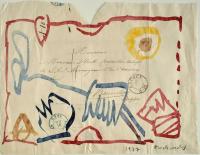 O mundo estilhaçou-se, quebrou-se em bocados, como uma esfera de cristal derrubada por um demónio. Reconhecê-lo não é um gesto de inação, nem de tristeza acabrunhada, é identificar como nos isolamos uns dos outros, como se separam as coisas umas das outras, ao ponto de não querermos saber, de não vermos, nem a miséria, nem o sofrimento, inscrito em cada uma delas. As relações criadas neste espartilho são desonestas por defeito. Os empresários de si próprios usam a língua como um instrumento, um ardil, a comunicação só procura efeitos decididos à partida.
O mundo estilhaçou-se, quebrou-se em bocados, como uma esfera de cristal derrubada por um demónio. Reconhecê-lo não é um gesto de inação, nem de tristeza acabrunhada, é identificar como nos isolamos uns dos outros, como se separam as coisas umas das outras, ao ponto de não querermos saber, de não vermos, nem a miséria, nem o sofrimento, inscrito em cada uma delas. As relações criadas neste espartilho são desonestas por defeito. Os empresários de si próprios usam a língua como um instrumento, um ardil, a comunicação só procura efeitos decididos à partida.
Mukanda
14.01.2026 | por Ricardo Norte
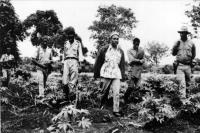 Nas regiões semiáridas, como Cabo Verde, a primeira medida é o aproveitamento e a utilização, com o mínimo de perda possível, da água das chuvas, com o intuito de diminuir a velocidade do escoamento, reduzir o desgaste das terras e reter, na medida do possível, as mesmas águas, aumentando a disponibilidade hídrica.
Nas regiões semiáridas, como Cabo Verde, a primeira medida é o aproveitamento e a utilização, com o mínimo de perda possível, da água das chuvas, com o intuito de diminuir a velocidade do escoamento, reduzir o desgaste das terras e reter, na medida do possível, as mesmas águas, aumentando a disponibilidade hídrica.
A ler
13.01.2026 | por Yussef B
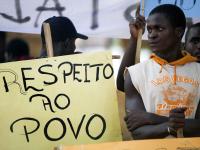 O que é claro é que a situação para a população é aguda e a miséria é profunda. Golpe ou não, as estruturas de realpolitik permanecem intactas: enraizadas num exercício vertical de poder onde as salas internas do poder permanecem trancadas e fora do alcance daqueles que esperam por um comboio algures fora de Lisboa. «O futuro?» diz um guineense a caminho de um trabalho diário no sector da construção e ri. «Estamos a falar de África —e o único futuro que alguma vez tivemos é o que está debaixo dos nossos pés.»
O que é claro é que a situação para a população é aguda e a miséria é profunda. Golpe ou não, as estruturas de realpolitik permanecem intactas: enraizadas num exercício vertical de poder onde as salas internas do poder permanecem trancadas e fora do alcance daqueles que esperam por um comboio algures fora de Lisboa. «O futuro?» diz um guineense a caminho de um trabalho diário no sector da construção e ri. «Estamos a falar de África —e o único futuro que alguma vez tivemos é o que está debaixo dos nossos pés.»
A ler
09.01.2026 | por Klas Lundström
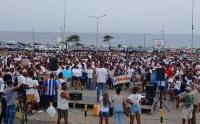 Perante um membro do partido, o povo cala-se, torna-se «carneiro» e manifesta alguns elogios ao governo e ao dirigente. Mas, na rua, pela noite, no sossego da aldeia, no café ou junto do rio, ouve-se essa amarga decepção do povo, essa desesperança, mas também essa raiva contida. (Fanon, 1961: 189)
Perante um membro do partido, o povo cala-se, torna-se «carneiro» e manifesta alguns elogios ao governo e ao dirigente. Mas, na rua, pela noite, no sossego da aldeia, no café ou junto do rio, ouve-se essa amarga decepção do povo, essa desesperança, mas também essa raiva contida. (Fanon, 1961: 189)
A ler
09.01.2026 | por Apolo de Carvalho e Alexssandro Robalo
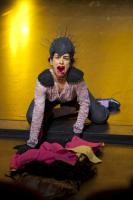 Esse espanto é acolhido como força metamórfica: transforma quem vê, mas também orienta o modo de investigar. Como escrever a partir de forças sentidas? Como integrar o espanto num método singular capaz de dar lugar ao estudo e à construção de uma linguagem crítica? Como a própria constata, a autora deixa-se atravessar pela experiência da obra numa trajetória que descreve como um movimento do Espanto ao Estudo. O espanto move e comove, põe forças em ação e gera a vontade de mantê-las vivas ao longo da escrita, evitando a desvitalização da experiência. Daí a insistência numa escrita que não fixa: quando Balona identifica a obra de Freitas como estruturada pelos termos “abertura, impureza e intensidade”, percebe-se que não se trata de categorias estanques, mas de palavras que ensaiam entradas possíveis na complexidade desta obra coreográfica.
Esse espanto é acolhido como força metamórfica: transforma quem vê, mas também orienta o modo de investigar. Como escrever a partir de forças sentidas? Como integrar o espanto num método singular capaz de dar lugar ao estudo e à construção de uma linguagem crítica? Como a própria constata, a autora deixa-se atravessar pela experiência da obra numa trajetória que descreve como um movimento do Espanto ao Estudo. O espanto move e comove, põe forças em ação e gera a vontade de mantê-las vivas ao longo da escrita, evitando a desvitalização da experiência. Daí a insistência numa escrita que não fixa: quando Balona identifica a obra de Freitas como estruturada pelos termos “abertura, impureza e intensidade”, percebe-se que não se trata de categorias estanques, mas de palavras que ensaiam entradas possíveis na complexidade desta obra coreográfica.
Palcos
08.01.2026 | por Liliana Coutinho
 Continuo a preferir a intensidade das experiências fora dos sets espectaculares e das redes virtuais. Carne com carne, cornos com cornos. Aliás, é cada vez mais sinistro, e meio bizarro, assistindo às trincheiras ideológicas, nichos de gosto, vigilância e algoritmização da vida, sabendo que estamos a dar tanto guito e informação aos oligarcas tecnológicos, o facto de permanecermos nos adornos virtuais. Como é que ainda nos damos ao trabalho de convencer, seduzir; expressarmos o que quer seja por essa via de “partilha”? Uma das nossas grandes contradições, mas a verdade é que este disparo assim de missivas, para sei lá que destinatários, é meio viciante.
Continuo a preferir a intensidade das experiências fora dos sets espectaculares e das redes virtuais. Carne com carne, cornos com cornos. Aliás, é cada vez mais sinistro, e meio bizarro, assistindo às trincheiras ideológicas, nichos de gosto, vigilância e algoritmização da vida, sabendo que estamos a dar tanto guito e informação aos oligarcas tecnológicos, o facto de permanecermos nos adornos virtuais. Como é que ainda nos damos ao trabalho de convencer, seduzir; expressarmos o que quer seja por essa via de “partilha”? Uma das nossas grandes contradições, mas a verdade é que este disparo assim de missivas, para sei lá que destinatários, é meio viciante.
Mukanda
07.01.2026 | por Marta Lança